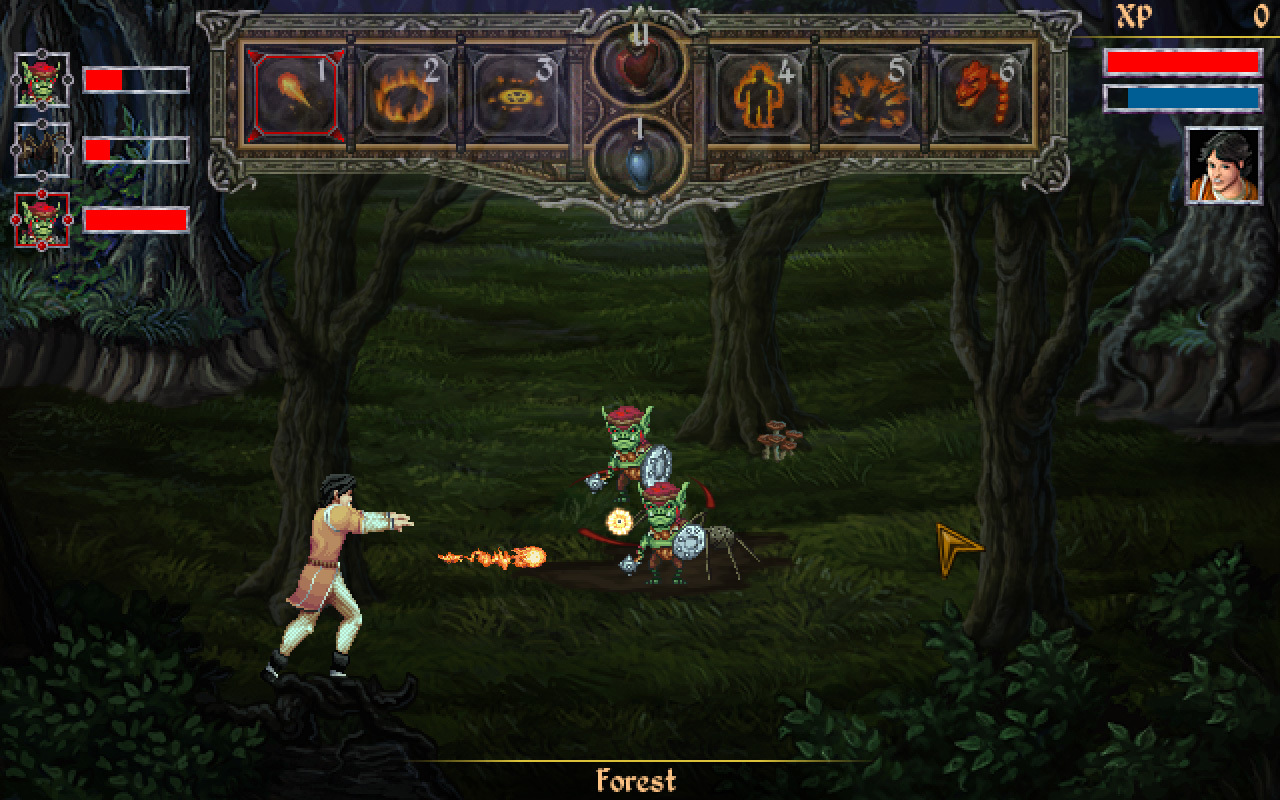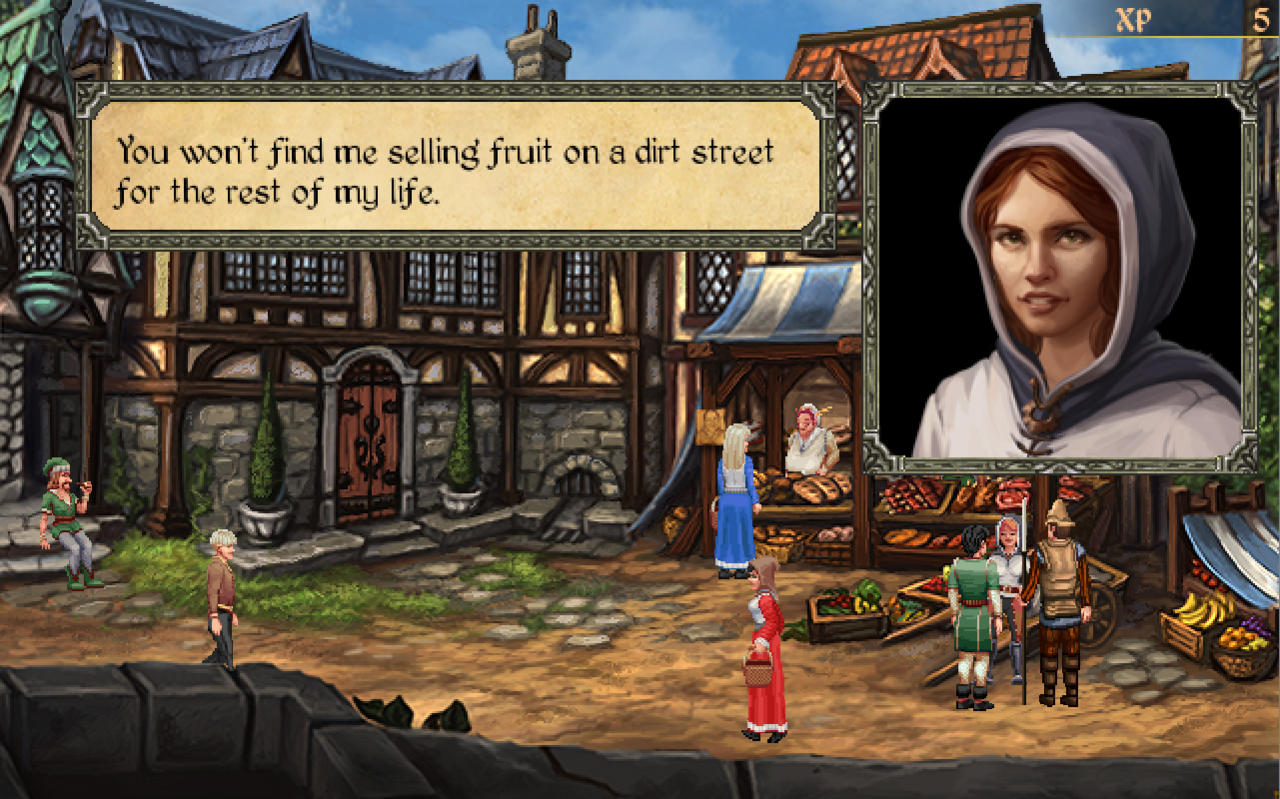It would be remiss to talk about Mage's Initiation: Reign of the Elements without considering its overt inspiration: Quest for Glory, a series of Sierra games from the early '90s. Quest for Glory was an ambitious hybrid of point-and-click adventures and Dungeons & Dragons-inspired role-playing featuring multiple classes, real-time combat, comprehensive statistic-based character building that all affected and changed the way you approached the game's obstacles. It remains a concept very few games have directly replicated, but Mage's Initiation proudly embraces this influence at every turn and draws liberally from the Quest for Glory template. It feels like a spiritual successor in many ways, but while the fantasy adventure it creates is enjoyable in its own right, its attempts to execute Quest for Glory's RPG-inspired diversity in its different playstyles aren't as robust and meaningful as they might initially seem.
Mage's Initiation follows D'arc, a teenager residing in a magic boarding school, as he faces his initiation to, well, become a mage. His big test requires him to overcome three major trials that ask him to deal with the mythic and fantastical, and along the way he hits some unexpected twists and uncovers a greater conspiracy. At the beginning of the game, you're given the opportunity to choose from four different mage classes, each focused around an element (fire, earth, wind, water) which will determine the selection of spells D'Arc will have at his disposal for both puzzle solving and combat. The path to overcoming the trials involves conversing with a diverse cast of characters, hunting for items and information, solving puzzles with logic and the environment, and fighting enemies with both force and wit.

Much of what Mage's Initiation does is enjoyable without the context of its influences. It's a well-paced adventure game throwback with solid voice acting, an intriguing mystery, and satisfying puzzles. As someone whose formative years were defined by endless replays of Quest for Glory, it's exciting to see the game trade so heavily on nostalgia for those games. Almost every element of Mage's Initiation can be immediately identified as a connection to Sierra adventure games. The beautifully illustrated environments, character portraits, and interface perfectly evoke the aesthetic, most obviously. But there are also parallels like attempts at Quest for Glory's signature pun-heavy humor, exotic character archetypes, and unique dark fantasy atmosphere. There's also the blatantly anachronistic, maze-like structure of the wasteland and forest areas that encouraged me to draw my own real-life maps to get around--just like I did playing Quest for Glory as a kid.
The issue with Mage's Initiation is that in a lot of cases, the clear ambitions to ape its source material don't reach the same meaningful depths of that source material, and as a result, the existence of some of these elements eventually feels like window dressing--whether you're aware of its influences or not. The aforementioned maze-like areas are fun to map out initially, but unlike Quest for Glory, you don't really need to internalize them because you don't have to navigate them regularly--key locations in Mage's Initiation are mostly clustered together in a straightforward manner. As a result, these environments feel strangely tacked on, an excessive obstacle you need to overcome to find a couple of quest items.
In a similar fashion, the four classes provide some minor variations in how you solve puzzles, but few of them actually feel like fundamentally different approaches. For example, to find a way into a particular second story window, you can use the air mage's levitating spell, use the water mage's water jet to activate a water wheel to ride, or grow a vine to climb as an earth mage. But the fact that these solutions are all just spells activated in the same manner never made me feel like I was thinking in a drastically different way for each mage or using a different set of tools--merely changing the location I pointed the cursor. This aspect becomes especially apparent upon multiple playthroughs.
Similarly, the classes' combat abilities fail to be fundamentally distinct. Each starts with comparable projectile attacks corresponding to their element, as well as defensive abilities that mitigate damage. None of these skills feel particularly unique in practice. Toward the end of the game, each class gets more powerful and varied spells, but their presence highlights another issue with combat: The high mana cost of these powerful skills rarely made using them feel worthwhile. I found it most effective to simply cast the low-cost basic projectiles repeatedly for basically all of the game's combat encounters, which rarely felt challenging or tense. This is due in part to the game's convenient auto-saving before any hostile encounter, which has the unfortunate effect of making it unnecessary to ever upgrade your character's constitution stat--I could just reload to the start of the encounter if I died.
There are a few major branching paths and decisions that affect the outcome of your relationship with certain characters and events of the plot, but these aren't tied to your class. Many of the more devilish roadblock puzzles that need to be cleared before you can progress, while satisfying to solve, have the same solution in each playthrough. The major point of difference between the adventures is that each class has its own unique side quest, which are interesting, but they're completely optional, easily missed, and feel like an afterthought because of that.

Some of the game's unique additions don't quite hit the mark, either. An entire economy of gems you can equip to augment your combat capabilities is initially interesting, but they're too bountiful, and easy to forget about because of the exploitable nature of combat. And for all the beautiful art in the game, there are a few key cutscenes that take a jarring deviation from the game's visual direction and a strange dip in quality, detracting from revelations they portray.
I ultimately enjoyed my time following D'arc through his journey, and Mage's Initiation left me curious about the events still to come. It's an entertaining adventure game, but its ambitions to incorporate a meaningful diversity of role-playing options fall disappointingly flat and feel inconsequential. Mage's Initiation is a fair appropriation of a hybrid formula that I was happy to consume, but its shortcomings made me more eager to revisit the series that inspired it for another run-through.



















